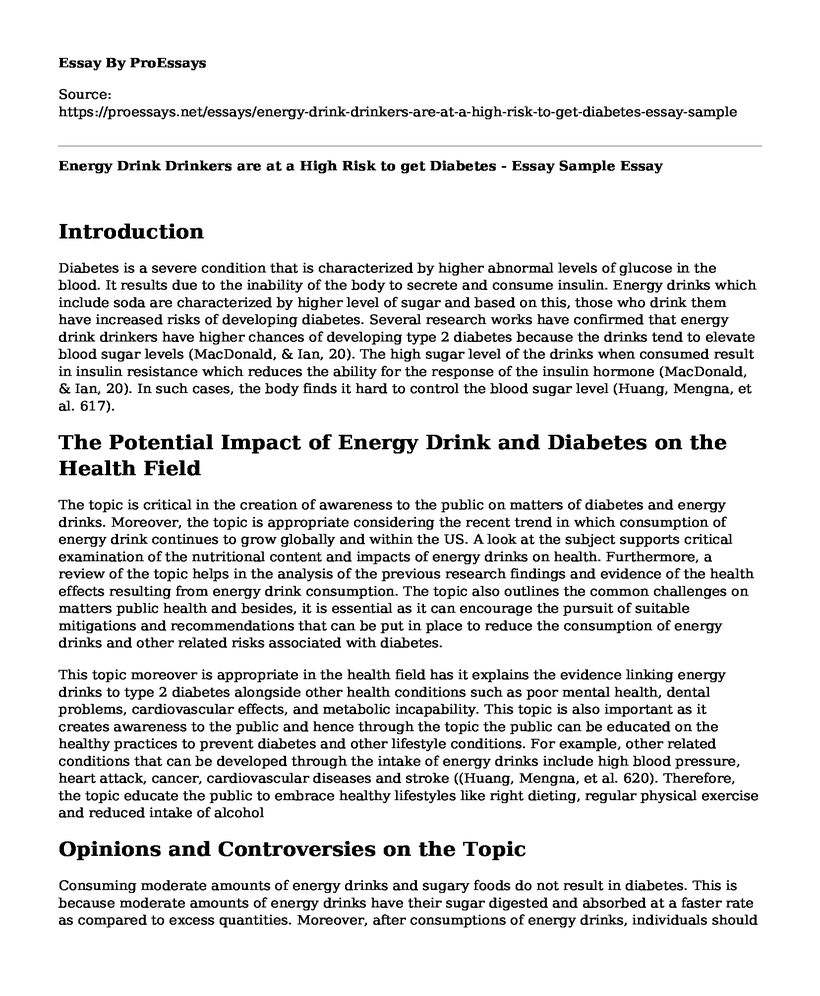Introduction
Diabetes is a severe condition that is characterized by higher abnormal levels of glucose in the blood. It results due to the inability of the body to secrete and consume insulin. Energy drinks which include soda are characterized by higher level of sugar and based on this, those who drink them have increased risks of developing diabetes. Several research works have confirmed that energy drink drinkers have higher chances of developing type 2 diabetes because the drinks tend to elevate blood sugar levels (MacDonald, & Ian, 20). The high sugar level of the drinks when consumed result in insulin resistance which reduces the ability for the response of the insulin hormone (MacDonald, & Ian, 20). In such cases, the body finds it hard to control the blood sugar level (Huang, Mengna, et al. 617).
The Potential Impact of Energy Drink and Diabetes on the Health Field
The topic is critical in the creation of awareness to the public on matters of diabetes and energy drinks. Moreover, the topic is appropriate considering the recent trend in which consumption of energy drink continues to grow globally and within the US. A look at the subject supports critical examination of the nutritional content and impacts of energy drinks on health. Furthermore, a review of the topic helps in the analysis of the previous research findings and evidence of the health effects resulting from energy drink consumption. The topic also outlines the common challenges on matters public health and besides, it is essential as it can encourage the pursuit of suitable mitigations and recommendations that can be put in place to reduce the consumption of energy drinks and other related risks associated with diabetes.
This topic moreover is appropriate in the health field has it explains the evidence linking energy drinks to type 2 diabetes alongside other health conditions such as poor mental health, dental problems, cardiovascular effects, and metabolic incapability. This topic is also important as it creates awareness to the public and hence through the topic the public can be educated on the healthy practices to prevent diabetes and other lifestyle conditions. For example, other related conditions that can be developed through the intake of energy drinks include high blood pressure, heart attack, cancer, cardiovascular diseases and stroke ((Huang, Mengna, et al. 620). Therefore, the topic educate the public to embrace healthy lifestyles like right dieting, regular physical exercise and reduced intake of alcohol
Opinions and Controversies on the Topic
Consuming moderate amounts of energy drinks and sugary foods do not result in diabetes. This is because moderate amounts of energy drinks have their sugar digested and absorbed at a faster rate as compared to excess quantities. Moreover, after consumptions of energy drinks, individuals should embark on some physical exercise to keep the body fit and help in metabolizing excess sugar. The major controversy about the topic is the difference in metabolism between fructose and glucose. For example, fructose is argued to be associated with obesity and diabetes while glucose is opined to healthy and hence cannot result in diabetes. However, fructose is obtained from sucrose, HFCS, and energy drinks which include energy drinks. Moreover, some meta-analysis has argued that replacing sugar with other energy equivalent nutrients pose no effect on the body weight thus cannot lead to diabetes (Rogers et al. 381). Due to this controversy, a lot of research needs to be done to ascertain the difference in sugar contained in sucrose and fructose and the related effects on the body.
Work Cited
Huang, Mengna, et al. "Artificially sweetened beverages, sugar-sweetened beverages, plain water, and incident diabetes mellitus in postmenopausal women: the prospective Women's Health Initiative observational study." The American journal of clinical nutrition 106.2 (2017): 614-622.
MacDonald, Ian A. "A review of recent evidence relating to sugars, insulin resistance, and diabetes." European journal of nutrition 55.2 (2016): 17-23.
Rogers, P. J., et al. "Does low-energy sweetener consumption affect energy intake and body weight? A systematic review, including meta-analyses, of the evidence from human and animal studies." International Journal of Obesity 40.3 (2016): 381.
Cite this page
Energy Drink Drinkers are at a High Risk to get Diabetes - Essay Sample. (2022, Nov 28). Retrieved from https://proessays.net/essays/energy-drink-drinkers-are-at-a-high-risk-to-get-diabetes-essay-sample
If you are the original author of this essay and no longer wish to have it published on the ProEssays website, please click below to request its removal:
- A Policy for the Americans With Disabilities Act (ADA) Essay
- The Effects of Vitamin C Deficiency - Research Paper
- Research Paper on Use of Kruskal-Wallis in Dentistry
- Comparing ACLS & BLS Status to GAP Mortality of Myocardial Disease - Essay Sample
- Research Paper on School Meals in Early Childhood: Planting the Seeds of Sustainability
- Essay Example on Prosthodontics: Enhancing Smiles with Dental Care
- The Epic Tales of David & Goliath & The Odyssey - Essay Example







